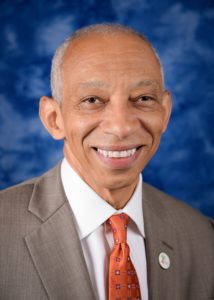
Long-term care providers across the country have detailed numerous ways how the pandemic has drastically and negatively impacted their operations since the virus first emerged in early March.
On several occasions, the challenge has been different from others for Danny Williams, president and CEO of Eliza Bryant Village in Cleveland. The recurring inquiry he receives? “How is it that a small, nonprofit, inner-city long-term care facility has managed to survive this historic crisis?”

Survival has been based on several key factors, Williams says: emergency funding and staffing.
“But what happens next year when that emergency funding disappears?” he asked rhetorically on Friday during a special press conference. “We need additional help if we’re going to truly withstand this pandemic.”
Williams, along with several other operators and LeadingAge leaders throughout the Midwest, detailed their pandemic stories and called on additional help from Congress during the conference call with reporters.
Williams said Eliza Bryant has been able to take advantage of emergency provider relief funding from both public and private sources to help cover some of its lost revenue.
Board and staff members also have been receptive to innovative programming to create new revenue streams. Its newly launched Elder Justice Center, which provides temporary safe space for seniors experiencing some for of abuse, is a key example of that, he explained.
Eliza Bryant, which is the oldest continually operating African American-founded long-term care facility in the United States and serves mostly Black residents, also has thrived from being able to provide culturally competent care. Williams said that “allows us to respond to some of the health disparities that are so often found in the primarily African-American clientele that we serve,” such as being at higher mortality risks for stroke, prostate and cervical cancer.
Thanks to its medical director and staff members, the facility has implemented several evidence-based protocols to address the disparities, as well as issues that are prevalent among its Black residents.
Williams added that retaining staff, and their expertise, is “vital to our long-term survival.”
“Despite these challenges we’re still here, but we need to know that help is on the way,” Williams said. “In the face of a pandemic, we need more talented staff, not fewer.”
The provider however has lost significant revenue due to the suspension of some of its programs, like its adult day center. Williams also noted that Medicaid underfunding has been a key issue prior to the pandemic, and hiring efforts have been difficult since the crisis started.
“Now these preexisting health conditions make our residents particularly vulnerable to infections like COVID-19, so an affordable, sustainable testing strategy and a plan for how we can replace staff who may need to temporarily quarantine if they test positive are all critical needs for us,” Williams said.
“We need additional funding, both in the short- and the long-term, to allow us to recruit and retain the level of competent, caring staff to take care of this population,” he added.
Other recommendations made included sharing resources, gathering personal protective equipment in groups, not individually, and finding access to rapid testing.





